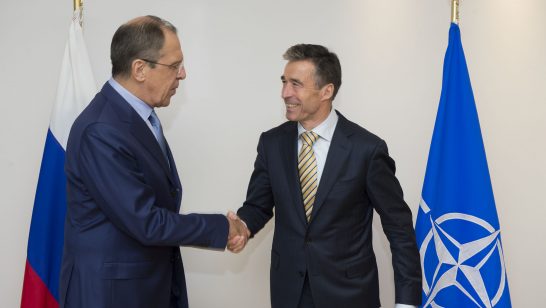
The Summit in London in December is a timely opportunity for NATO to position itself as a regional alliance of democracies in a mostly illiberal environment. Allies need to come to agreement on how to contain Russian subversion campaigns, how to transform the neighbouring countries aspiring to join NATO, and how to contain the instability from NATO’s southern periphery. These are the three most important challenges that NATO faces at 70 and the basis on which leaders should discuss the alliance’s future.
Containing Russian subversion
Five years after the annexation of Crimea, NATO has developed a military concept to deter Russia by denial in the Baltics and Poland (enhanced forward presence and rapid reaction). NATO allies need to complement this with an equally ambitious strategy to counter the new wave of Russian subversive operations in the space between diplomacy and warfare.
Russia does not act out of an anti-liberal agenda as such, but it does see the open societies of the West as an opportunity to weaken public confidence in their free institutions. A growing number of operations show what Russia is prepared to do: the hacking of the Democratic National Committee in 2016, the attempted coup d’état in Montenegro on the way to NATO membership in 2016, and the nerve gas attack in the United Kingdom against a former double agent in 2018.
Allies must leave no doubt about their ability to remain united against attacks on critical infrastructure and democratic processes of another ally. NATO needs to enhance anti-subversion capacity among those allies that are most exposed to Russian hybrid tactics and disinformation with the Baltic States in the first line.
Transforming NATO-aspiring neighbours
North Macedonia’s expected accession in early 2020 will perhaps be NATO’s last enlargement. Nothing indicates that Bosnia-Herzegovina will overcome its deep national divide, while Ukraine and Georgia’s membership aspirations as a matter of realpolitik end in Moscow. Yet, NATO continues to have an interest in transforming the neighbouring countries, which remain unstable due to semi-authoritarian tendencies and (within NATO’s competency) the fact that their security sectors continue to serve the politically or financially stronger rather than the citizens or the state.
NATO must recognise the profound political character of security sector reform, which requires some groups to give up their power and sources of wealth. Even in partnership with the EU, NATO is unable to tip domestic balances of power in favour of lasting change. This calls for a fine-tuning of Western conditionality to ensure reform delivery. Russia’s aggression is an opportunity insofar as it increased Ukrainian and Georgian dependency on the West, whereas peace in the Western Balkans remains dependent on the presence of NATO as a stabiliser.
Containing the southern instability
Meanwhile, the southern periphery emerges as the most significant source of instability, the containment of which calls for a greater NATO involvement. Coming to a consensus about how to deal with the migration pressure, which did not end in 2015, will require extraordinary leadership to accommodate the growing concern about open borders. The migration pressure deepens not only the domestic splits within the United States and Western Europe, but also the geopolitical lines of division between Europe’s northern/southern and western/eastern countries.
NATO’s deployment of vessels to the Aegean Sea in 2016 showed the utility of military assets to reinforce border security, more of which may be required as the Middle East remains in disarray. NATO refrained from collective action in the fight against ISIS but it can hardly turn a blind eye to Turkey as its own allié terrible. The concerns about Turkey’s authoritarian turn and the acquisition of Russian missile systems pale compared to Turkey’s threats to allow a resumption of migration and its offensive into north-eastern Syria. NATO in the past tolerated numerous authoritarian backlashes but never since the end of the Cold War did it confront an ally acting against the interests of the alliance to this extent.
Rethinking NATO’s partnerships
The European peace project is no longer expansive, but is in reactive mode to illiberal trends on its periphery that threaten to intrude the liberal core. Positioning NATO in an illiberal world requires it to manage its external relations with a higher degree of strategic clarity. First, NATO should recognise the value of the advanced partners of European Neutrals and the EU, which are like-minded and which share the need to ensure domestic resilience. Second, the alliance should recognise the importance of the associated partners in eastern and south-eastern Europe, which continue to hold a potential for transformation. Third, it should develop ways to manage the periphery through containment of Russian influence and the instability emanating from the Middle East and North Africa, which pose more existential challenges to European security.
NATO at 70
The NATO Summit in London in December 2019 is a timely opportunity draw conclusions on 70 years of alliance history. NATO was born in 1949 to contain a totalitarian enemy that threatened the post-war democratic Europe, a role it fulfilled masterfully for 40 years until the fall of the Berlin Wall in 1989. The following 30 years until today gave NATO the opportunity to promote democracy in Central and Eastern Europe and (with much less success) in Afghanistan. NATO at 70 must find its place in a mostly illiberal environment that it is unable to transform, but which is certain to transform NATO, if it does not stand up to the challenge.
The opinions articulated above represent the views of the author, and do not necessarily reflect the position of the European Leadership Network (ELN) or any of the ELN’s members. The ELN’s aim is to encourage debates that will help develop Europe’s capacity to address pressing foreign, defence, and security challenges.


